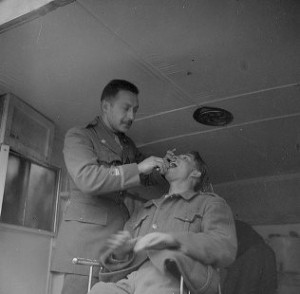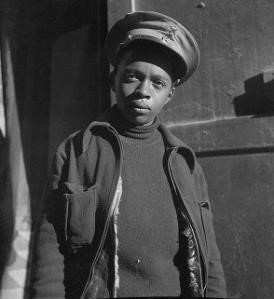An American Dentist In Spain ~ Jack Klein by M. M.

Dental Wagon at work, “Doc” Jack Klien, February 1938. The 15th International Brigade Photographic Unit Photograph Collection ; ALBA Photo 11; ALBA Photo number 11-0865. Tamiment Library/Robert F. Wagner Labor Archives. Elmer Holmes Bobst Library, 70 Washington Square South, New York, NY 10012, New York University Libraries
THE VOLUNTEER Volume 2, January 15, 1938
No other International volunteer in Spain has been in so unique a position as Dr. Jack Klein, the American dentist with a roving commission. Ever-busy, ever smiling he has covered all the fronts, travelling over 10,000 miles in his dental truck, and treated about 3,000 persons, including members of all the International Brigades and nearly all of their battalions. He has also penetrated to the little pueblos off the main highways to give many a native Spaniard a first introduction to a common hygienic practice of better-developed countries.
Dr. Klein believes his traveling dental office represents the first time in warfare that such a flexible method has been used to keep troops actually at the front in good shape. At the time he began his work, the 15th Brigade had already been in the line for about three months. It was the idea of Dr. Edward Barsky, original chief of the American Medical Service, to have the men’s teeth checked without further delay after such a long time. Since the vast majority of tooth ailments are caused by neglect, treating them would prevent many of the serious cases that had already occurred. The equipment and the science were there, but the soldiers could not come to it. It would therefore go to them.
An American ambulance was too low, so it was exchanged for a British one with a body high enough for Dr. Klein to stand up in. Sanitary cabinets were built tight against the wall of the truck inside. The chair was installed, anchored into a platform specially devised on the floor of the truck. A flight of steps was tacked on leading from the ground outside. And he was ready for business. First call to the Lincoln Battalion and its neighbors.
One case on his very first day of work, May 5, is an example of the strange experiences in store for the former Brooklyn practice loner. Twenty patients were waiting at the Jarama cook-house when he drew up. Gradually they were disposed of, but one comrade refused to mount the chair, declining his turn time and again because there was no “gas”. Once in a while he would take a gulp of anis from the canteen he had brought along. He could not be convinced that the anesthetic administered by injection could deaden pain. Dr. Klein had actually begun to clean up the “office” when the reluctant man finally decided to take a chance without “gas”. He turned out to be Englishman who had never been to a dentist in his life. Eight rotten upper teeth and roots were removed in that single sitting. So satisfied was he with the painlessness of the operation that he insisted on having the lower teeth also treated before departing.
He was persuaded to come back another time, and thereafter he returned whenever possible. In the next few weeks Dr. Klein extracted all of the poor teeth and subjected the gums to a hardening process as preparation to fitting a plate into the mouth. He had actually taken measurements.
Dr. Klein still keeps them as a memory of a comrade who had become one of his best friends. For on July 8, in the surging advance of the 15th Brigade at Brunete, he fell as adjutant of the British Battalion. He was Lieutenant Charles Goodfellow, of Glasgow who had come to Spain in December 1936.
The American dentist found that although there were many difficulties only one could not be overcome. That was the constant presence of flies. It was only the coming of cool weather at the end of October that drove the plague away. The other problems were resolved through experience, ingenuity, inspiration or resignation. Thus he became used to working without a perfectly adjustable dental chair; with a jerky engine operated by foot as a substitute for a smooth and silent-turning electric unit for drilling; with doubly extra effort to sterilize his instruments on an open truck into which the breeze blew germ-laden dust. Thus he improved his services until he was able not only to extract teeth, but also to treat infected jaws and gums and to make silver amalgam restorations.
The strangest hardship of all was one that eventually became quite a pleasure. That was the business of operating in public. Ten years of practice in a quiet, sheltered, completely private office had bred habits which took Dr. Klein a considerable effort to overcome. But almost as if he had actor’s blood in his veins, he adapted himself to standing on what is practically a stage before an audience intently scrutinizing his every move. He has even devised a few tricks for effect, such as making extractions ahead of other work in order to impress the waiting (and watching) group of patients with the before-and-after contrast.

George Waters, February 1938. The 15th International Brigade Photographic Unit Photograph Collection; ALBA Photo 11; ALBA Photo number 11-0670. Tamiment Library/Robert F. Wagner Labor Archives. Elmer Holmes Bobst Library, 70 Washington Square South, New York, NY 10012, New York University Libraries.
Together with the assistant he found and trained here, George Waters, 20 year old San Francisco Negro. Dr. Klein has driven and drilled his way through the fronts of Jarama, Cordoba and Aragon; the training camps, the rest homes, the convalescent hospitals. His greatest thrills, however, have come from the plain and simple dwellers of the villages. He finds it easy to understand but hard to accept the homage a peasant pays him for surcease from pain. He has treated very many of these people. Almost all have pressed some gift upon him which he with equal insistence has refused. His Spanish is good enough to enable him to explain that this is merely an example of what their People’s Front Government wants to institute fully and universally after victory; that for such and similar reasons the International Brigades have come to help, both at the front and in the rear.
In the last few campaigns Dr. Klein has accompanied the 15th Brigade to the actual fronts. Right in the line of fire he has taken his place, supervising the stretcher-bearers, assisting the battalion doctors. He has readily adapted his professional skill and experience m jaw surgery to wounds and other frontline needs.
After a campaign he takes his truck out again and resumes his busy dental routine. His office hours are as long as daylight lasts.













Chris,
Do you know who was the author, M.M.